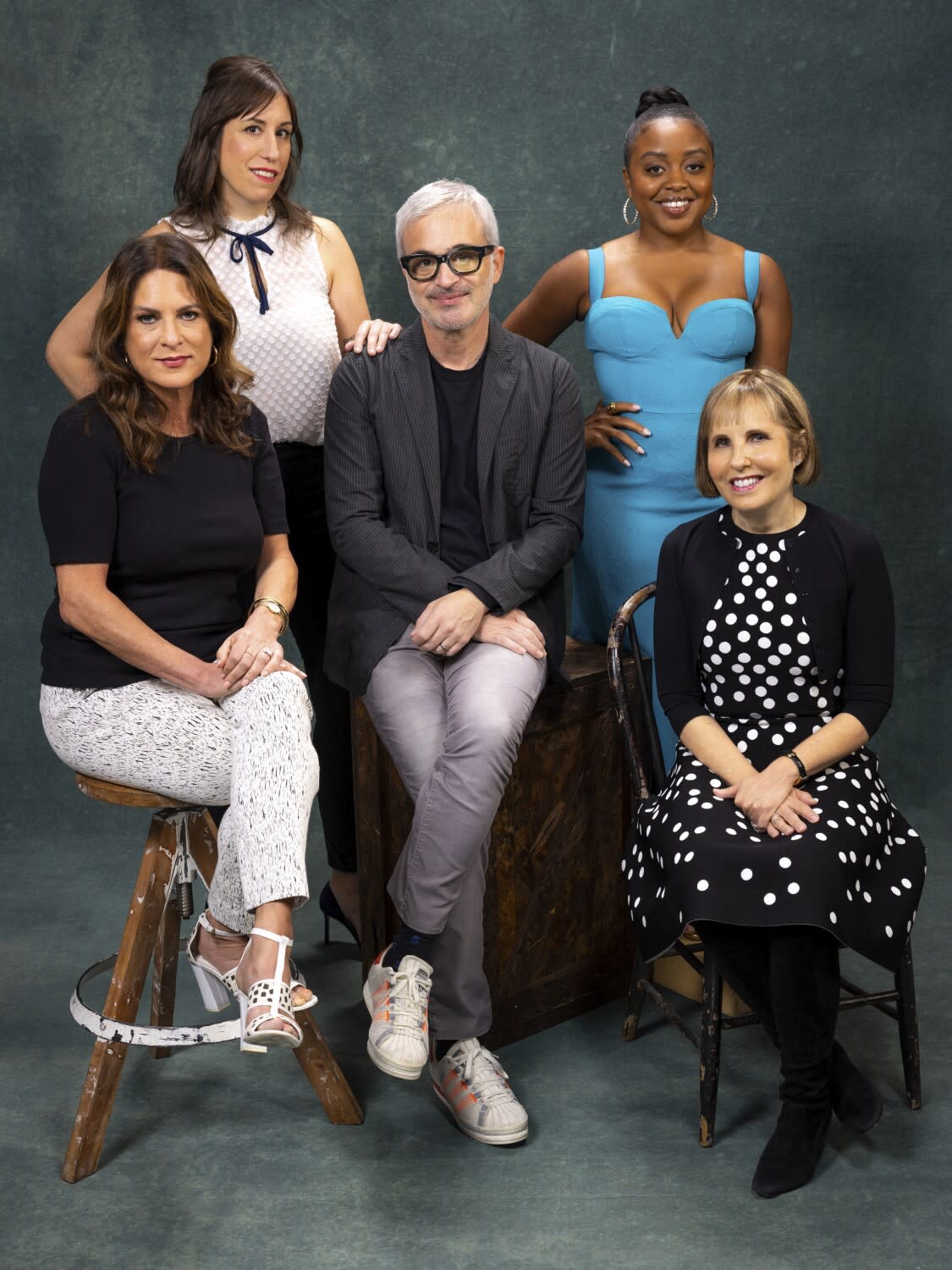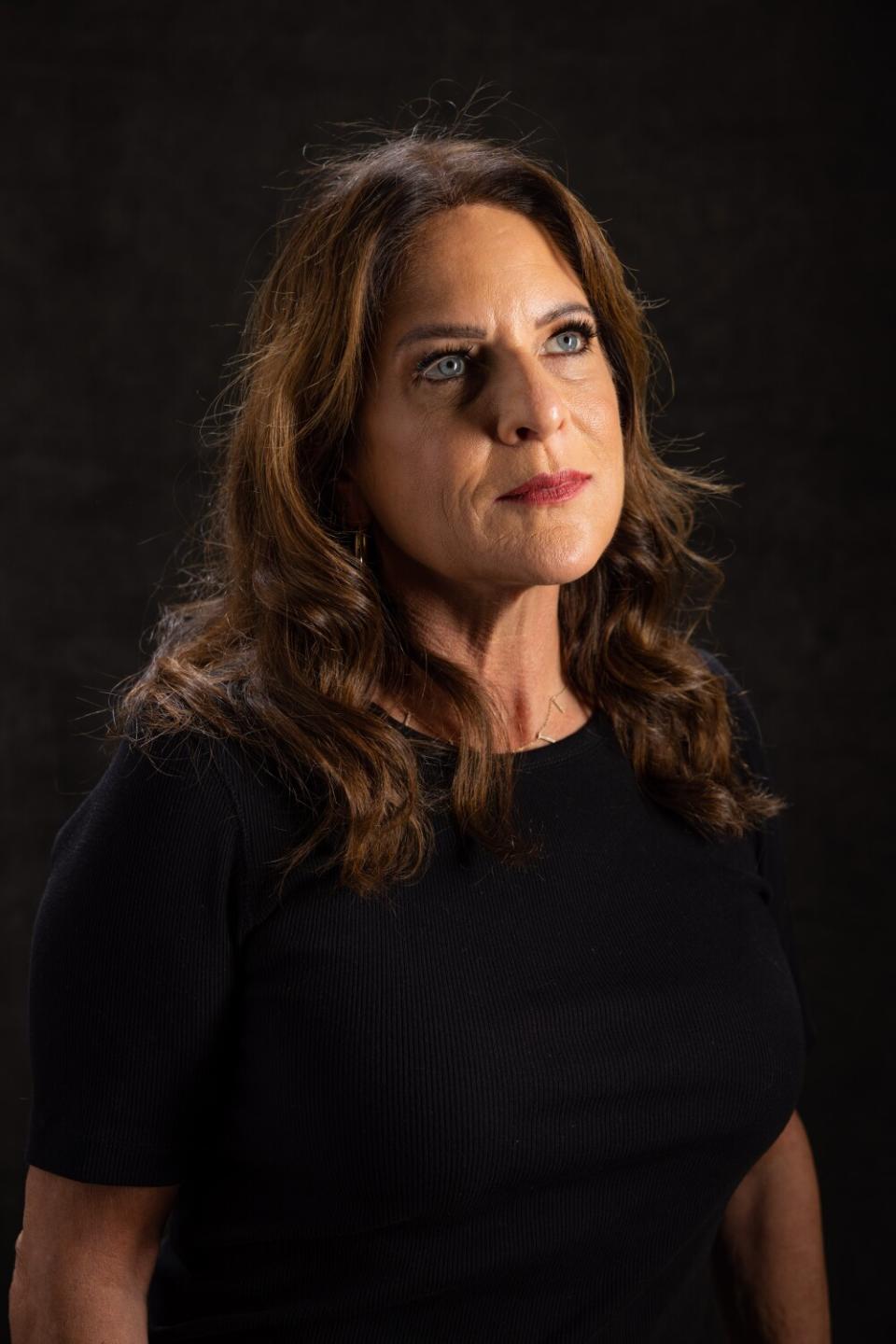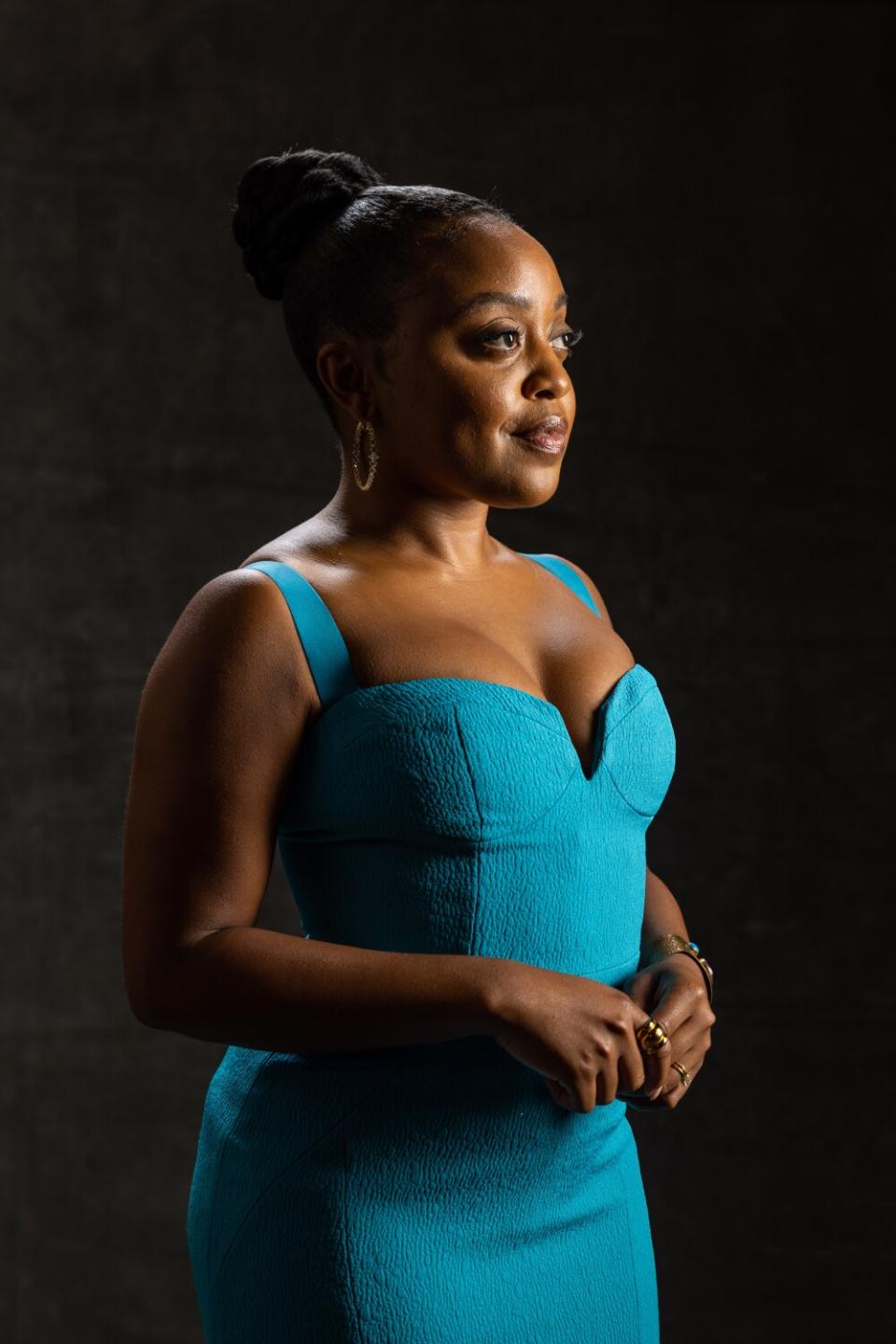Quinta Brunson, Alex Kurtzman, more take us behind the scenes of top series
- Oops!Something went wrong.Please try again later.
- Oops!Something went wrong.Please try again later.
- Oops!Something went wrong.Please try again later.
- Oops!Something went wrong.Please try again later.

With an increasingly crippling choice of television shows to consider, it feels like there is something out there for every kind of viewer. The five showrunners who took part in this season’s Envelope Emmys Roundtable had different guiding forces when imagining who their viewer was while developing their shows — and their connections were personal.
Quinta Brunson, whose "Abbott Elementary" explores the life of educators at an underfunded public school and is inspired by Brunson's mother, who was a public school teacher for many years, had family on her mind.
"For 'Abbott,' which I knew I wanted to go to network television, I was thinking of ... my mom and dad," said Brunson, who also stars in the sitcom as second-grade teacher Janine Teagues. "They’re not critics. They just enjoy TV, and that’s my favorite type of person. My mom and dad don’t have much to say other than, 'I’m having a good time,' or 'I’m not.' And then they change the channel. But there’s nothing else to be said. That’s kind of my favorite TV viewer."
“The Man Who Fell to Earth," a reimagining of the 1976 David Bowie film as a contemporary science fiction series about an alien (played by Chiwetel Ejiofor) trying to save his home planet while helping save ours, became an opportunity for Alex Kurtzman to make sense of our current reality.

"I think we were our audience at that point," says Kurtzman, who co-created the series adaptation with Jenny Lumet. "I think we were writing for ourselves ... because, in the middle of the pandemic, you're looking for the silver lining anywhere you can take it. I think writing that show kept us sane in that we were just processing what we were seeing through the eyes of these characters and getting to do it with those extraordinary actors."
Michelle King, who co-created Paramount+'s "The Good Fight" and "Evil," Ashley Lyle of Showtime's buzzy "Yellowjackets" and Cathy Schulman, showrunner of Showtime's "The First Lady," joined in the wide-ranging conversation — edited here for length and clarity — that covered casting concerns, growing your audience and the impact of a tweet from Stephen King.
Ashley and Quinta, your series, "Yellowjackets" and "Abbott Elementary," just finished their first seasons, and they were some of the most talked about shows. I'm curious — when did you realize that audiences were catching on?
Quinta Brunson: For me, there were two main things. It was seeing online chatter in a very organic way. I think there is modified online chatter that maybe your social page itself is starting, but there was just online engagement when I wasn't looking for it. That started to happen after the premiere of our first episode, which actually was before the rest of the season. It was a month before. So, seeing just unsolicited engagement.
Then, it was when I took a trip to Universal Studios, and it was after the first episode's premiere, and one of the operators at one of my favorite rides addressed me as the character on my show. That was just so surreal. I hadn't had that experience, but she said, "You're Janine. You're on the show I just watched this week," and I was like, "Yeah, I am." That was very jarring.

Ashley Lyle: I think it happened a little bit later for us. For the first maybe month that we were airing, I was on Twitter and searching our own hashtag.
Brunson: No shame.
Lyle: I would just [search] #Yellowjackets and see what people were saying. Some people were talking about it, but I'd have to go looking. Then, Bart [Nickerson, co-creator of the series and Lyle's spouse] and I took a little mini vacation right after the holidays, and of course, I'm sitting by the pool on my phone. He was like, "Get off your phone. This is very unhealthy for you," but that was when it was finding its way into my actual Twitter feed, as opposed to going out and looking for it. I remember I turned to him at one point. I said, "Something's happening. This is actually really cool." He actually got me to put my phone away. And then, one day he looked at his phone, and he gasped. Stephen King had tweeted about our show, and I am an absolute diehard Stephen King fan. I've read, I think, everything he's written, and I cried.
Do you feel like there's more allowance now for the buildup? I feel like there was a period where, if a show was premiering and there wasn't an audience right away, it got canceled after two episodes, three episodes. Michelle or Alex, do you feel like there's time now to let the build happen?
Michelle King: I think the expectations are different for streaming than they were for network. They expect those numbers to build as opposed to, with network, they feel as though, "Wait a minute. If you didn't capture it by the second episode, goodbye." So, I think you're right. It has changed.
Alex Kurtzman: Absolutely. There's an assumption also that people are not going to watch your show on streaming until the whole thing has dropped because they're going to want to binge it. So, now that's baked into the thinking about when they're going to pick a show up or what they're going to expect the numbers to be because most people now don't want to watch week-to-week.

Do you think we're heading somewhat back toward that? We see the strategies sort of shifting depending on the show sometimes. Do you hope we get back to that place? Is it going to be necessary at a certain point?
Cathy Schulman: I don't think we're headed back there, but I think that it's a blend. I think that people can watch it however they want to watch it. That's that's going to be the ultimate —
Kurtzman: I think that's right.
Lyle: I think there is a little bit of a push again to the week-to-week though. I think people may be over-binged.
Schulman: Which could have been COVID-related too.
Brunson: And like real life, binging anything doesn't feel good always at the end.
Kurtzman: It's also nice to unwrap the present slowly. It's really nice to lay in suspended wait for the next episode. That's what we grew up on, but now getting to ... I don't know. I guess it depends. I like both. I think people want both.
Casting is so crucial to the magic of a series — Cathy, you have an insane pool of talent with "The First Lady": Gillian Anderson, Michelle Pfeiffer, Viola Davis. When you're dealing with real-life, notable figures, how hard is it to find the person who doesn't necessarily look like them, yet captures that resemblance, makes you think of them?
Schulman: When doing ensemble work like this, the key thing is to try to create a balance energetically so that you don't feel, as an audience, that you want to be with one versus the other. Once we started with Viola, who is a really high intensity actor, obviously, it was crucial that the other women had a similar kind of strength of presence. We started there, and then we looked for the essence of the first lady versus the physical appearance.
That was a hard decision, particularly with Eleanor [Roosevelt] because she was a 6-foot-2, large woman, and we cast a 5-foot-2, tiny little wisp of a person in Gillian Anderson. But her energy was the same as Eleanor. She's neurotic and nerdy and a workaholic, and she does this really well. For Michelle Pfeiffer, she's simultaneously very strong and very brittle, which is unusual in any actress. We went straight for her for that reason because Betty Ford was that as well. With Viola, the thing about Michelle Obama, it's all truth all the way, and there's nobody who's more honest and just hardcore verite than Viola.

There was some talk about Viola's choices or mannerisms as Michelle Obama. What role does the showrunner have, as opposed to a director, in shaping the performance of the actor? Did you have a lot of discussions?
Schulman: Yes. There were a lot of discussions, and I'm going to say that each of the actresses approached it differently. I think, for Viola, not that I want to speak for her, but she did begin with a lot of the physical characterizations. She felt that it was really important to start with getting the sense of the physicality of the character and then find her own emotional root in it. But it was the hardest character to play. Michelle Obama is enormously well-known and well-loved, and we all think we know everything about her. So, we would talk a lot about approach, and the trick was to believe that anything that she was saying or doing was similar to something she had actually said or done.
Ashley, so many people cannot get over the casting on "Yellowjackets," just in terms of the adults and then the younger characters playing them, how they matched up. What did you think of that? And then, does that put extra pressure as you start thinking about casting for Season 2? Please tell us who's playing Lottie.
Lyle: I cannot reveal. We're actually kind of early in that process now. We're really working on the story and the scripts right now, but it's a tall order. Oh, my God. When we started casting the show, I think we were all very much just thinking, "What have we done to ourselves?" It was similar [to what Cathy was saying] in that we really decided pretty early on that we were going to think a little bit more about sort of an energetic match and what was the essence of these actresses, as opposed to trying to be really matchy-matchy with the physicality. It worked better than we thought. I mean there was a lot of holding up headshots side-by-side and squinting at them and going, "We think that could work. I think so."
So, it's going to be really hard for Season 2.
Yes. Especially with someone like Lottie because Courtney Eaton, who plays the younger version is so unique and —
Twitter has given suggestions.
I'm well aware, but the thing is that, frankly, Courtney is Asian, and so Twitter is suggesting a lot of white actresses. So, we're like, "You guys, we're not going to be doing that." We've got some ideas, and we'll see how it goes.
Alex, something you've talked about before is making sense of the world around you as an artist. You and Jenny began writing this sequel to "The Man Who Fell to Earth" in 2018. What were you trying to make sense of then and how did that evolve to what we see on the screen today?
Kurtzman: I think we were just looking around us and seeing how divided the world was becoming. We were seeing that, despite all of the connectivity of social media, it was amplifying our differences and it was separating people. Then, the pandemic hit, and it seemed to amplify it even more. It wasn't just that our country was so politically divided. It was that the world seemed to be fractioning. There's several laundry lists of things that would happen on a daily basis that just would make our heads spin, and we just weren't understanding what we were seeing. And then during the pandemic, during George Floyd, when everything cracked wide open, everything that we had been writing about suddenly became... It's that horrible moment when you've hit the zeitgeist actually in that circumstance.
We were trying to make sense of what we were seeing from the point-of-view of the ultimate outsider, the ultimate other who was coming in and, in that really wonderful way, recognizing from just a simple point-of-view, here's who you are. And calling it out in ways that I think we have forgotten about often because there's just so much noise around the way we perceive things. Faraday, Chiwetel's character, distills things down to elemental simplicity.
What is the last show that really hooked you? And why should I watch it?
Lyle: The non-embarrassing answer is I loved "Severance." It's weird and funny and dark and sinister and just so well done. It's just beautiful. Oh, my God — so angry at the cliffhanger ending though. I was like, "No," but that was great. And then I've been watching a lot of "90 Day Fiancé: Before the 90 Days," and that just is a sociological experiment; it is fascinating. I can't stop. Those things are an hour and a half each, and they fly by. You're really just watching a group of people ruin each other's lives in slow motion. I shouldn't enjoy it as much as I do, but then you root for them. I get very attached.
Kurtzman: Ditto "Severance," for sure. And "Station Eleven." I think part of what ...
Brunson: Can I say real quick, for the longest time, I thought that was a Shonda Rhimes show.
"Station 19"?
Brunson: Right. A bunch of guys similar to you were like, "Yeah. 'Station Eleven' is my s—," and I was like, "What is happening?" Not that you wouldn't be [into "Station 19"], but I was confused for a very long time. So, every time I hear it, I'm cracking up.
Kurtzman: I think that what those shows do, and there's actually quite a few like it, although those shows are very singular, is they really play around with the form. And they, to me, typify the best of what streaming has to offer because they're messing with narrative. They're messing with your relationship to what you think the story needs to be, particularly in "Station Eleven" — not "19." Because it shuffles the deck on time. There's something profound that happens when it works because it gives you this perspective on what happens to people over long periods of time, particularly in moments of trauma, that I think is very powerful.
Brunson: For me, I think the last show that really hooked me was "The Righteous Gemstones" on HBO. I'm a huge Danny McBride fan. I think he's just the funniest. He always gets me, cracks me up. I think he's always going into a special small world and finding the magic and the meat in it. It's a fantastic comedy that, without trying, makes a huge comment on the megachurch problem in America, but it's just so funny and compelling.

King: This may be an obscure pull, but "Abbott Elementary."
Brunson: Oh, my goodness.
King: Loving it.
Brunson: Thank you so much.
King: It is that good. It really is. The characters are fantastic, and it warms my heart that it's on network, too, because it appeals to everybody. It's telling the stories in a very true way. My dad was a public school teacher. I went through public school, and it's very true without being the tiniest bit schmaltzy or preachy.
Schulman: I just got back from living in Africa for seven months, so I'm horribly behind in terms of television ... I just watched "WeCrashed," and I was pretty fascinated, I have to say, with the performances of both Anne Hathaway and Jared Leto and how completely character-driven it was. I was pretty amazed by the pulse of how that sustained itself over the course of it. And I've just started "Yellowjackets," which I mentioned before, and I'm obsessing. I'm just trying to keep understanding how much can character drive an audience back if we can't have an unexpected cliffhanger. There's only so much you can do with history. And then trying to rewatch "The Crown" and understand that, as well, which I really love. I never watched it carefully enough, and now I'm really seeing, "wow, they're good."
For the record:
11:30 a.m. June 9, 2022: An earlier version of this post said “The First Lady” showrunner Cathy Schulman created the show. The show’s creator is Aaron Cooley.
This story originally appeared in Los Angeles Times.

